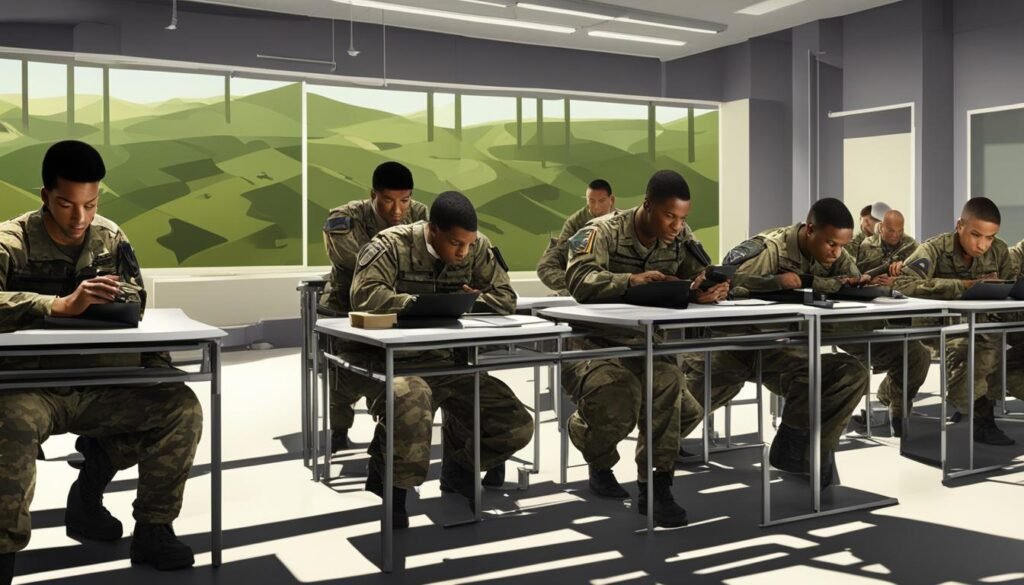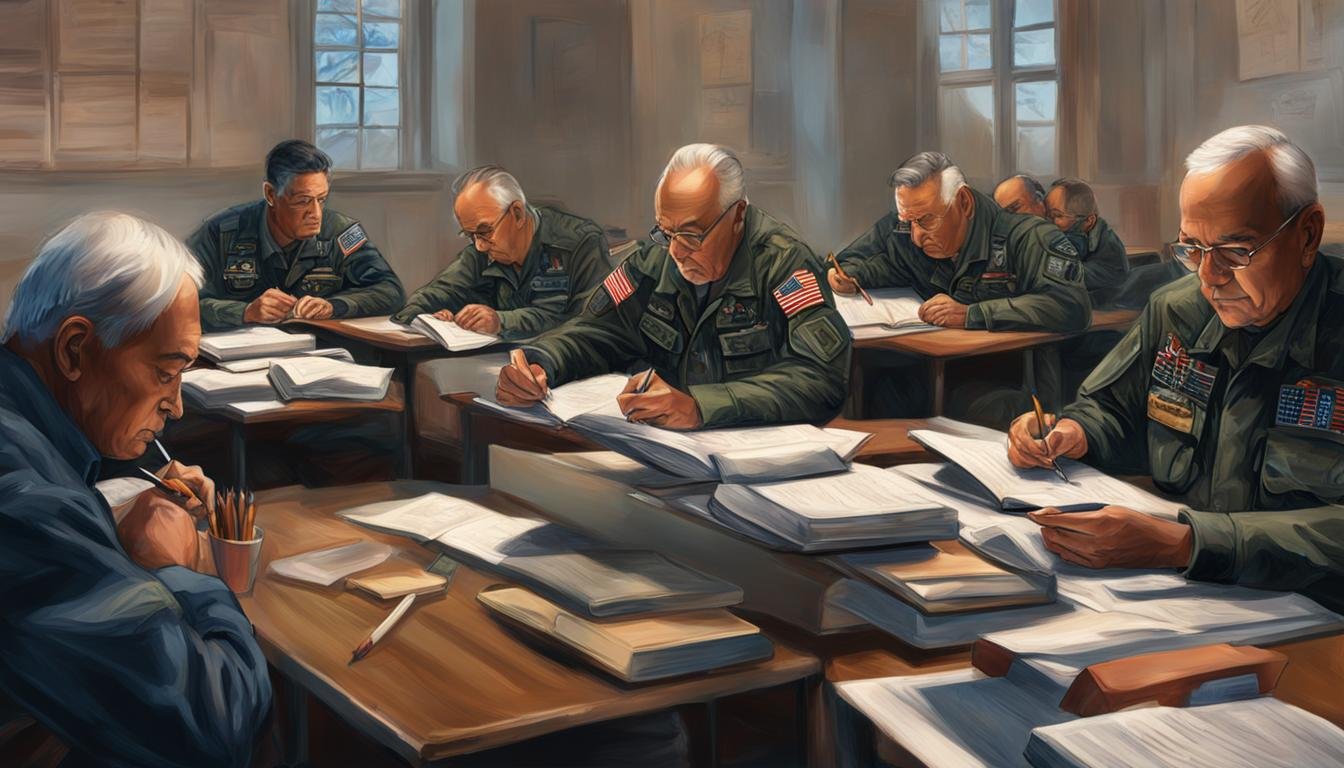A literature review conducted by the Clearinghouse for Military Family Readiness at Penn State delved into the effects of military training on the academic performance of military-connected students. This review examined various factors such as socioeconomic status, cognitive ability, and academic performance that influenced both military enlistment and access to higher education.
The study hypothesized that young men with inconsistent statuses, such as lower socioeconomic backgrounds coupled with higher cognitive abilities, were more likely to join the military as a means of overcoming barriers to education and improving their life opportunities.
Key Takeaways:
- Military training has an impact on standardized test skills and academic performance.
- Socioeconomic status, cognitive ability, and academic performance influence both military enlistment and access to higher education.
- Military training programs aim to address challenges faced by military-connected students and provide academic support.
- These programs enhance cognitive abilities, academic achievement, and test-taking skills.
- There is a positive correlation between military training and cognitive development.
Factors Affecting Military Enlistment and Academic Opportunity

The impact of military training on standardized test skills and academic performance is influenced by several key factors. A literature review conducted by the Clearinghouse for Military Family Readiness at Penn State revealed that young men with inconsistent statuses in socioeconomic background, cognitive ability, and academic performance are more likely to enlist in the military as a means of self-advancement. This correlation between military training and test scores highlights the potential for military service to improve educational outcomes for individuals facing social and personal disadvantages.
Military enlistment provides greater access to higher education for those with certain status configurations. Specifically, the study found that military service enhances academic performance and increases enrollment in associate degree programs. These findings suggest that military education plays a pivotal role in bridging the educational gaps for military-connected students and improving their cognitive abilities, ultimately leading to improved standardized test performance.
“Military enlistment can be seen as a means of self-advancement for young people with social and personal disadvantages.”
To further support the academic success of military-connected students, military training programs such as the Future Soldier Preparatory Course have been introduced. These programs aim to address the challenges faced by these students, such as deployment-related transitions and relocations. By providing academic support and improving test-taking skills, these programs help fill educational gaps resulting from inadequate schooling experiences.
Overall, the literature review highlights the significance of military training in influencing standardized test skills and academic opportunity. It underscores the importance of status configurations, such as socioeconomic status, cognitive ability, and academic performance, in shaping the decision to enlist in the military. Military education not only improves test scores but also fosters cognitive development and prepares recruits for successful military service.
Table: Impact of Military Training on Academic Opportunity
| Factors | Influence on Military Enlistment | Effect on Test Scores and Academic Performance |
|---|---|---|
| Socioeconomic Status | Young men with lower socioeconomic status and higher cognitive ability more likely to enlist | Improved academic performance and increased enrollment in associate degree programs |
| Cognitive Ability | Higher cognitive ability combined with social disadvantages drives enlistment | Enhanced cognitive development and improved standardized test skills |
| Academic Performance | Inconsistent academic performance influences the decision to join the military | Fill educational gaps and improve overall academic achievement |
The table illustrates the impact of factors such as socioeconomic status, cognitive ability, and academic performance on military enlistment and test scores. It demonstrates the correlation between military training and academic opportunity, highlighting how military education can bridge the gap and provide enhanced educational outcomes for military-connected students.
Challenges Faced by Military-Connected Students and the Role of Military Training

The educational journey of military-connected students can be filled with unique challenges that can impact their academic performance and cognitive development. Deployment-related transitions, frequent relocations, and the recent disruptions caused by the COVID-19 pandemic have all contributed to these difficulties. However, military training programs have been designed to address these challenges and provide crucial support to military recruits.
Military training plays a significant role in enhancing the cognitive abilities of recruits and preparing them for academic achievement. These training programs, such as the Future Soldier Preparatory Course, aim to improve not only test-taking skills but also fill educational gaps resulting from inconsistent schooling experiences. The U.S. Army recognizes the importance of cognitive abilities and academic performance for military success, and thus invests significantly in the academic track of these programs. This investment reflects the Army’s commitment to preparing recruits for the academic demands they may face during their military careers.
“Military training programs provide valuable educational opportunities for recruits who may have faced challenges in their previous schooling experiences.”
By providing academic support and resources, military training programs strive to ensure that recruits are equipped with the necessary skills and knowledge for successful military service. These programs not only aim to improve academic performance but also foster overall cognitive development. The effect of military training on academic achievement can be observed through the positive correlation between military service and improved educational outcomes, as seen in previous studies.
In conclusion, challenges faced by military-connected students in the education system can have a detrimental impact on their academic performance and cognitive development. However, military training programs play a crucial role in addressing these challenges and preparing recruits for the academic demands of military service. Through their emphasis on cognitive abilities and academic achievement, these programs provide valuable educational opportunities for recruits and contribute to their overall success in both military and civilian spheres.
How Does Military Training Impact a Student’s Ability to Prepare for Standardized Tests Like the SAT/ACT?
Military training can greatly enhance the abilities of students to excel in standardized tests like the SAT/ACT. The discipline, focus, and problem-solving skills instilled through strategies for military students can greatly contribute to their success in these exams, providing them with a strong advantage over their peers.
Conclusion
The literature review presented in this article provides valuable insights into the impact of military training on standardized test skills and academic performance. It reveals that military training plays a significant role in enhancing cognitive abilities and promoting cognitive development among military-connected students.
One key finding from the review is the correlation between military training and improved test scores. It suggests that military education not only prepares recruits for successful military service but also fosters academic growth and achievement. By focusing on cognitive abilities and academic performance, military training programs offer valuable educational opportunities for individuals who may have faced challenges in their previous schooling experiences.
The review also emphasizes the importance of status configurations, such as socioeconomic status, cognitive ability, and academic performance, in influencing military enlistment and access to higher education. It highlights how military service can serve as a means of self-advancement for young people with social and personal disadvantages, providing them with improved life opportunities through education.
In conclusion, the literature review underscores the positive impact of military training on standardized test skills and cognitive development. It reveals the potential of military service to enhance educational outcomes for military-connected students by addressing challenges and filling educational gaps. By investing in cognitive abilities, academic achievement, and test-taking skills, military training programs contribute to the overall growth and success of individuals in both military and educational contexts.



